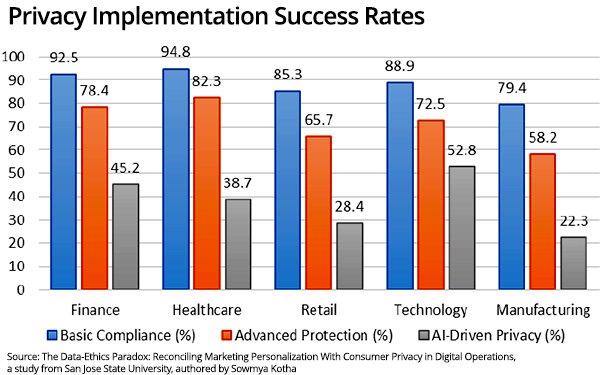
Brands are getting ever more precise at
tracking consumer behavior. But this is raising serious ethical concerns, judging by The Data-Ethics Paradox: Reconciling Marketing Personalization With Consumer Privacy in Digital Operations, a study
from San Jose State University, authored by Sowmya Kotha.
The key to ethical use of data is informed consent, Kotha writes in an article.
“Transparency in data collection has become a critical ethical imperative, requiring organizations to clearly communicate their data practices while maintaining technical accuracy and
comprehensibility,” she notes. But it’s a big chore.
Of companies polled for this study, 87% use advanced data collection systems that track an
average of 12 data collection touchpoints per customer. And 73% deploy AI-driven personalization.
advertisement
advertisement
What’s more, there has been a 45% increase in
multi-channel tracking since 2021.
However, only 42% undertake comprehensive privacy measures, and even fewer — 28% — score highly in both data
collection and privacy.
To begin with, 64% of firms face technical implementation difficulties in this area, and only 18% of the average budget goes to
compliance, with 7.5% of this allocated to GDPR adherence.
In addition, 52% of those attempting AI implementation face privacy hurdles. Overall, there is an average
8.3-month delay in technology adoption.
On the consumer side, 82% are very concerned about privacy. Yet 67% opt into personalization when there is a clear value
proposition.
Brands achieve 56% increased acceptance when they offer transparent benefits. And 73% of consumers are favorably influenced by privacy policy
transparency.
Specifically, transparent companies achieve 43% higher customer retention rates and 67% increased trust metrics.
The
conclusion? Brands should follow an ethical framework emphasizing transparent data practices and consumer control, Kotha contends. But further study is required.
Kotha surveyed 300 marketing professionals, and in addition, conducted focus groups with 48 participants across eight sessions with interviews of15 privacy officers, legal experts, and
marketing directors. The article was published in the International Journal of Research In Computer Applications and Information Technology.